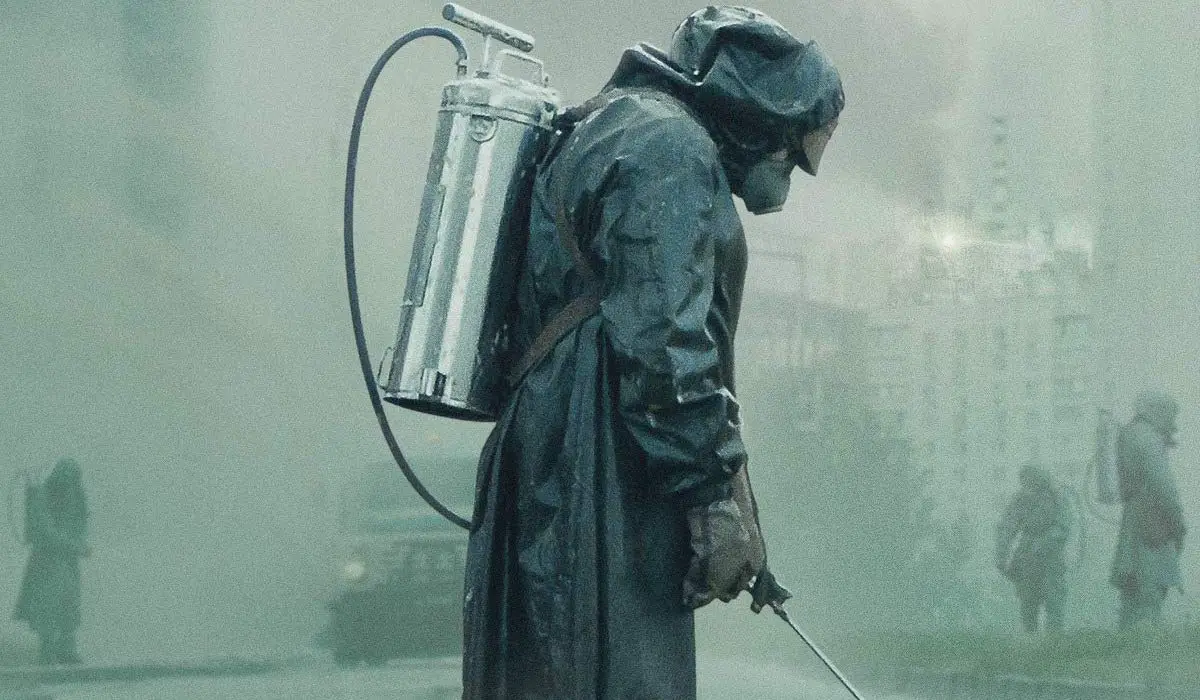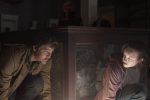HBO’s historical fiction miniseries “Chernobyl” is the scariest monster flick of the year. It’s far more frightening than the 2019 summer blockbuster “Godzilla: King of Monsters,” which has been in theaters at the same time as the release of the acclaimed miniseries.
The new “Godzilla” movie features a giant three-headed monster rampaging through cities on a quest to end mankind. The monster in “Chernobyl” is harder to pin down.
Is the monster radiation, an invisible villain which tears through victims, burning them slowly until they die a painful death? Perhaps the villains are the buffoonish plant operators, who were bafflingly negligent in pursuit of personal promotions. Or is the monster the Soviet system and refusal of government officials to acknowledge any imperfections?
All of the previously listed antagonists exist in “Chernobyl,” creating the complex and layered conflict driving the miniseries. But the most menacing monster is humanity, in terms of what happens when the dominant species becomes powerful beyond its own comprehension and what lies people tell to deny their loss of control.
In “Godzilla: King of Monsters” humanity is weak, exposed to the whims of near all-mighty monsters fighting each other. On the other hand, “Chernobyl” shows the strength of humanity through the illustration of how people have harnessed nuclear energy. A film where humanity is weak, like “Godzilla,” might appear to be more frightening than a story like “Chernobyl,” but that’s not necessarily the case.
Once the reactor core explodes in “Chernobyl,” the audience has no understanding of the situation, of how a reactor works or how one could explode. After all, the casual viewer is not a power plant operator.
Further horror of “Chernobyl” springs from the power plant operators also having no idea what is happening. The series asks how a RBMK reactor can explode, and the scientists, who are supposedly in the best position to understand the situation, are constantly repeating the question.
Experts, such as scientists and plant operators, do not have control of the situation. Therefore, the audience can barely hope to understand or have a grasp of it either. The knowledge that Chernobyl is man-made, resulting from both the errors of individuals and of social systems, compounds the terror.
“Chernobyl” becomes even more frightening and suspenseful because the audience’s questions are not answered until late in the series. The only question that gets answered right away is what impact does the explosion of an RBMK reactor havee on ordinary people nearby.
The audience sees the effects the monster of radiation has on the people — such as the firefighters who are gruesomely burned — trying to prevent the situation from escalating. Many have the same understanding of nuclear energy as a casual viewer. Bystanders and townspeople of Pripyat suffer brutal consequences of radiation, ranging from sickness to death.
Additionally, the miniseries focuses on the volunteers such as divers and coal miners, who are ordinary working people, issued a task to complete with potentially millions of lives hanging in the balance. The brave people who step up, knowing they would likely experience an excruciatingly painful death as a result of their acts, are ordinary people who are overwhelmed, under-informed and afraid.
There is a series of scenes where divers are sent to drain water from tanks inside Chernobyl to prevent permanent groundwater contamination for millions of nearby residents. The dread and claustrophobia are unmistakable as the volunteers navigate their way through dark corridors, knowing the slightest misstep could mean death. As a result of the emphasis on volunteers, the audience is forced to wonder how they would respond if they needed to step up to save lives from the effects of a dangerous power plant.
In “Godzilla,” the audience can distance themselves from the unrealistic plot of action heroes fighting monsters (or monsters fighting monsters); whereas, in “Chernobyl,” the audience is cramped into a dangerous situation against an invisible threat, where the slightest mistake results in death for characters who, for the most part, are not involved in causing the reactor explosion. Making the characters’ situations incredibly easy to relate to brilliantly ties the audience closely to their stories, making the horror all the more intimate.
The men in charge of the situation at Chernobyl have lost control, evidenced by their rampant denial and lies, which are arguably the main theme of the series. Before any visuals pop up on screen, Professor Valery Legasov (played by Jared Harris) poses a question to the audience: “What is the cost of lies?”
Many characters participate in the denial and lies, from members of the Soviet governing apparatus to powerplant operators to General Secretary Mikhail Gorbachev. Denial is particularly found in the loathsome Dyatlov (Paul Ritter), whose gross mismanagement in pursuit of self-promotion while in command of the power plant control room exacerbated the severity of the Chernobyl incident drastically.
The audience sees such chaotic denial many times. Yet, a scene of Dyatlov in the first episode is especially illustrative. A power plant worker explains to his superior that he has seen graphite on the ground, to which Dyatlov’s responds “You didn’t,” before he begins a rampage of yelling.
When local townspeople complain about radiation shortly after, Dyatlov conjures haphazard excuses of how they are wrong before exhibiting symptoms of poisoning himself, as the power plant operator vomits before losing consciousness.
Fittingly, Dyatlov’s similarly incompetent comrade blames the unconscious man’s symptoms on exposure to feed water for the reactor, instead of acknowledging how severe the situation is at Chernobyl. The characters deny that a problem exists, even when they are being physically and mentally torn apart.
Men denying the environmental catastrophes they have committed while pursuing personal promotions is familiar to the target audience of “Chernobyl.” Contemporary viewers cannot distance themselves from denial, especially considering overbearing power humanity has on the natural world. For an American audience, there is the legacy of Three Mile Island, which marked its 30 anniversary earlier in 2019, but that incident is very different and less severe than Chernobyl.
“Chernobyl” is relevant because of the way the denial of a problem in the face of humanity’s great power is addressed, as the show explains the cost of lies is the destruction of individuals and the social systems they organize. The series is terrifying because the casual viewer can easily place themselves in the minds of the characters who stumble into someone else’s mistake.
In an age of out-of-this-world, superpowered and fantastically unrealistic antagonists and fights, this HBO miniseries touches on the root of human fear. Author, activist and 2020 presidential candidate, Marianne Williamson, has a quote that helps explain the terror “Chernobyl” inspires: “Our deepest fear is not that we are inadequate but that we are powerful beyond measure.”
















